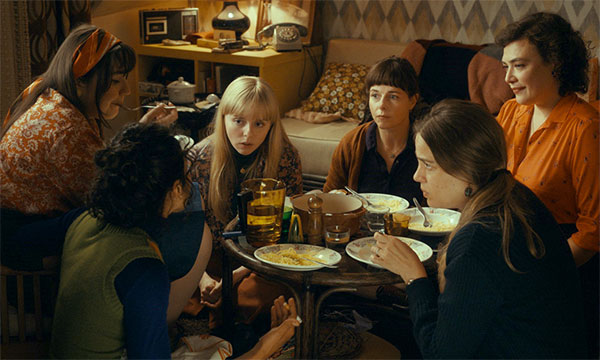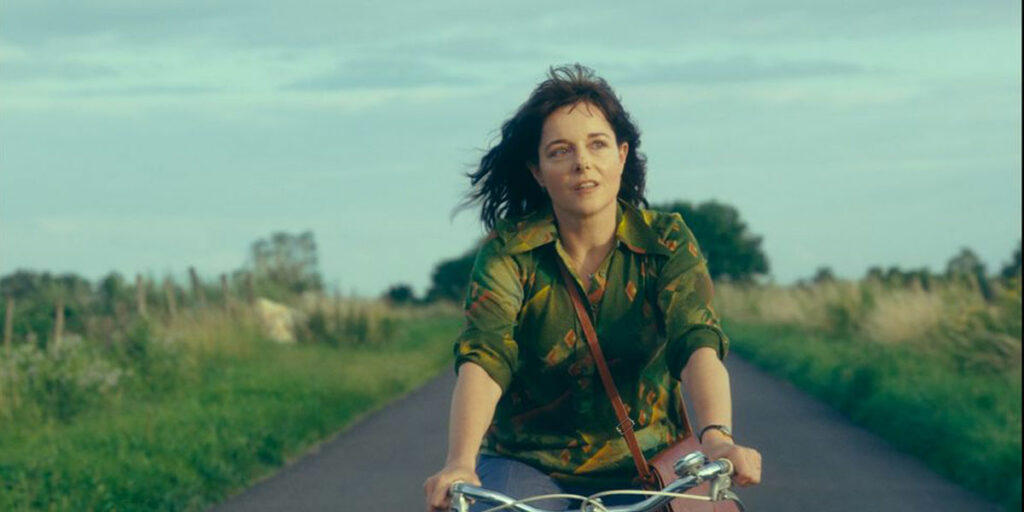Blandine Lenoir’s Angry Annie is a poignant period piece about the fight for abortions in 1970s France that feels appropriately timely, if a little slow paced.
While the fashions and the décor of Blandine Lenoir’s Angry Annie (Annie Colére) might be dated, the struggle at the heart of it is despairingly not. Access to safe abortion is a human right. One that, sadly, too many are still being denied. Lenoir’s film isn’t too concerned with the political aspect of the quest to legalise abortions in 1970s France, but instead is a gentle film about the compassion, bravery and care the women and men of MLAC (or the Movement for the Liberty of Abortion and Contraception) provided to countless women before the right to abortion was enshrined in to law.
Annie (Laure Calamy) is a factory worker, married with two children, who has just discovered that she’s pregnant with a third. But it’s not the good news some may see it as for Annie, and so she attends a clandestine MLAC meeting to have an, at the time, illegal abortion. The process is explained thoroughly, calmly and without judgement to her by two female volunteers, Hélène (Zita Hanrot) and Monique (Rosemary Standley), and performed by a liberal, sympathetic doctor. The experience, along with a personal tragedy, inspires her to help other women receive the same care, and she soon finds herself a dedicated member of MLAC, juggling a new purpose in life with existing obligations at home with her husband Philllippe (Yannick Choirat).
Lenoir’s film takes place in 1974 when abortions were still illegal, but France was facing so much protest against those enacting the law that it was only a matter of time before it changed. But despite the sequences of sign making and impassioned discussion, Angry Annie isn’t necessarily a political film. It’s much more of a character study, keeping its focus decidedly away from the ins-and-outs of political protest and firmly on the women at the heart of it.

It’s a film about sisterhood, and the intimacy that grows between a disparate but delicately connected group of women as they undertake abortions in a calm environment that’s completely free of judgement. These women are nurses, teachers, factory workers and housewives; teenagers trembling through their first pregnancy and older women with grown children of their own. It’s an underground network of people who understand the complexities of making such a tough decision. It emphasises the importance of women understanding their own bodies, as well as the need for them to be active in support of legalising it, because bodily autonomy is at the core of the pro-choice movement. It’s emotional and real; some characters are more developed than others, but the emotional turmoil felt and shared by every one of them feels really authentic.
Despite its feminist camaraderie though, some may find Angry Annie a little slow. In terms of plot, it’s pretty simply following one woman as she finds a passion, with the much anticipated law change happening via a news reel, somewhat tacked on near the end of the film. Annie has such obvious affection for the people around her that it’s impossible not to feel comforted by her warmth, and Calamy gives a poignant, grounded performance that acts as a really effective centre point for the film. But some might wish for a bit more meat on a story about a struggle that is still very much ongoing.
Everyone – regardless of age, occupation, race, sexuality, gender identity or marital status – should have access to safe, judgement-free abortions. Lenoir highlights the instrumental work an incredibly dedicated group of people undertook in securing reproductive rights for the women of France with Angry Annie, and the end result is a moving, quietly impactful film. It reinforces how backwards the overturning of laws like Roe v. Wade is, even if the film itself doesn’t particularly engage with the political aspects for the majority of its runtime. Angry Annie is perhaps a little relaxed in its pacing, but it’s still informative, important and infuriatingly timely.
Angry Annie is now available to watch on digital and on demand.

